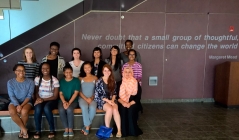
STEM. It’s practically the UMBC motto. On campus and beyond, there is a huge push to involve today’s young people in the sciences.
Despite these efforts, laboratories, offices and workshops are still filled in majority by men. To address this disparity, a new student-led initiative integrates STEM education with gender empowerment programs.
“The Reach Initiative is a mentorship research program for young high school women in Baltimore,” said Isabel Geisler, junior global studies major, and the mind behind the initiative. “[It] not only works to gain their interest in the STEM fields, but also sustain that interest.”
The program, in its pilot year, currently consists of ten high school students and ten graduate and undergraduate mentors. In its focus on older students, the program is different from many others.
“The way that most people describe STEM is a pipeline,” said Geisler. STEM education seeks to capture students in elementary school, and shuttle them down the pipe all the way to college and to a career.
However, Geisler recognized the need for increased focus on high school. “We can’t be putting all of our resources into middle school and elementary school,” she said, “We need to fill that gap in the pipeline.”
The Reach Initiative introduces young women to different STEM fields, and enables them to conduct original research under the supervision of their mentors. This research will be presented in a banquet at the end of the academic year.
What makes Geisler’s program unique, however, is its focus on feminism.
“We have a lot of gender empowerment programming that we do,” said Geisler. The program is designed to actively acknowledge the gender bias that exists in STEM careers. Geisler felt that while other programs focus on science education, they fall short of addressing these gender issues.
“So, this year we’re planning programs for micro-aggressions, for consent, and sexual harassment, for mental health and for communication skills,” said Geisler. In doing so, she hopes to address and combat real issues that face women in STEM fields.
After years of planning, the program is finally underway. Geisler hopes to double the participants next year, with aspirations for further growth. “At some point I’d like to see it be implemented at other colleges,” she said.
For now, her team of mentors is working to make a change in the local community, to bring about social change. “We don’t live in a post-sexist society,” said Geisler, and the Reach Initiative seeks to prepare young women for this reality.





